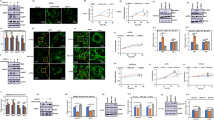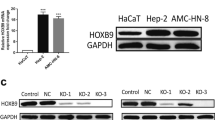Abstract
Objective
Cancer stem cells (CSCs) are the main driving force of tumorigenesis, metastasis, recurrence, and drug resistance in epithelial ovarian cancer (EOC). The current study aimed to explore the regulatory effects of ring finger protein 144A (RNF144A), an E3 ubiquitin ligase, in the maintenance of CSC properties and tumor development in EOC.
Methods
The expressions of RNF144A in EOC tissue samples and cells were examined. The knockdown or overexpression of a target gene was achieved by transfecting EOC cells with short hairpin RNA or adenoviral vectors. A mouse xenograft model was constructed by inoculating nude mice with EOC cells. Co-immunoprecipitation was used to determine the interaction between RNF144A and LIN28B.
Results
Downregulated RNF144A expression was observed in ovarian tumor tissues and EOC cells. Low RNF144A expression was positively associated with poor survival of EOC patients. RNF144A knockdown significantly enhanced sphere formation and upregulated stem cell markers in EOC cells, while RNF144A overexpression prevented EOC cells from acquiring stem cell properties. Also, the upregulation of RNF144A inhibited ovarian tumor growth and aggressiveness in cell culture and mouse xenografts. Further analysis revealed that RNF144A induced LIN28B degradation through ubiquitination in EOC cells. LIN28B upregulation restored the expressions of stem cell pluripotency-associated transcription factors in EOC cells overexpressing RNF144A.
Conclusion
Taken together, our findings highlight the therapeutic potential of restoring RNF144A expression and thereby suppressing LIN28B-associated oncogenic signaling for EOC treatment.
Graphical abstract

• Ring finger protein 144A (RNF144A) is downregulated in epithelial ovarian cancer (EOC) tissues and cell lines.
• The overexpression of RNF144A prevents EOC cells from acquiring stem cell properties and inhibits ovarian tumor growth.
• RNF144A induces LIN28B degradation through ubiquitination in EOC cells.
• LIN28B upregulation restores the expressions of stem cell pluripotency-associated transcription factors in EOC cells overexpressing RNF144A.







Similar content being viewed by others
Data availability
All data generated or analyzed during this study are included in this published article.
References
Amini S, Fathi F, Mobalegi J, Sofimajidpour H, Ghadimi T. The expressions of stem cell markers: Oct4, Nanog, Sox2, nucleostemin, Bmi, Zfx, Tcl1, Tbx3, Dppa4, and Esrrb in bladder, colon, and prostate cancer, and certain cancer cell lines. Anat Cell Biol. 2014;47(1):1–11. https://doi.org/10.5115/acb.2014.47.1.1.
Ayob AZ, Ramasamy TS. Cancer stem cells as key drivers of tumour progression. J Biomed Sci. 2018;25(1):20. https://doi.org/10.1186/s12929-018-0426-4.
Balzeau J, Menezes MR, Cao S, Hagan JP. The LIN28/let-7 pathway in cancer. Front Genet. 2017;8:31. https://doi.org/10.3389/fgene.2017.00031.
Doubeni CA, Doubeni AR, Myers AE. Diagnosis and management of ovarian cancer. Am Fam Physician. 2016;93(11):937–44.
Ghanta KS, Li DQ, Eswaran J, Kumar R. Gene profiling of MTA1 identifies novel gene targets and functions. PLoS One. 2011;6(2):e17135. https://doi.org/10.1371/journal.pone.0017135.
Haq S, Das S, Kim DH, Chandrasekaran AP, Hong SH, Kim KS, et al. The stability and oncogenic function of LIN28A are regulated by USP28. Biochim Biophys Acta Mol basis Dis. 2019;1865(3):599–610. https://doi.org/10.1016/j.bbadis.2018.12.006.
Ho SR, Mahanic CS, Lee YJ, Lin WC. RNF144A, an E3 ubiquitin ligase for DNA-PKcs, promotes apoptosis during DNA damage. Proc Natl Acad Sci U S A. 2014;111(26):E2646–55. https://doi.org/10.1073/pnas.1323107111.
Iliopoulos D, Hirsch HA, Struhl K. An epigenetic switch involving NF-kappaB, Lin28, Let-7 MicroRNA, and IL6 links inflammation to cell transformation. Cell. 2009;139(4):693–706. https://doi.org/10.1016/j.cell.2009.10.014.
Jin X, Kim LJY, Wu Q, Wallace LC, Prager BC, Sanvoranart T, et al. Targeting glioma stem cells through combined BMI1 and EZH2 inhibition. Nat Med. 2017;23(11):1352–61. https://doi.org/10.1038/nm.4415.
Kenda Suster N, Virant-Klun I. Presence and role of stem cells in ovarian cancer. World Journal of Stem Cells. 2019;11(7):383–97. https://doi.org/10.4252/wjsc.v11.i7.383.
Khan A, Li D, Ibrahim S, Smyth E, Woulfe DS. The physical association of the P2Y12 receptor with PAR4 regulates arrestin-mediated Akt activation. Mol Pharmacol. 2014;86(1):1–11. https://doi.org/10.1124/mol.114.091595.
Kim S, Han Y, Kim SI, Kim HS, Kim SJ, Song YS. Tumor evolution and chemoresistance in ovarian cancer. NPJ precision oncology. 2018;2:20. https://doi.org/10.1038/s41698-018-0063-0.
King CE, Cuatrecasas M, Castells A, Sepulveda AR, Lee JS, Rustgi AK. LIN28B promotes colon cancer progression and metastasis. Cancer Res. 2011;71(12):4260–8. https://doi.org/10.1158/0008-5472.can-10-4637.
Kong D, Banerjee S, Ahmad A, Li Y, Wang Z, Sethi S, et al. Epithelial to mesenchymal transition is mechanistically linked with stem cell signatures in prostate cancer cells. PLoS One. 2010;5(8):e12445. https://doi.org/10.1371/journal.pone.0012445.
Koo CL, Kok LF, Lee MY, Wu TS, Cheng YW, Hsu JD, et al. Scoring mechanisms of p16INK4a immunohistochemistry based on either independent nucleic stain or mixed cytoplasmic with nucleic expression can significantly signal to distinguish between endocervical and endometrial adenocarcinomas in a tissue microarray study. J Transl Med. 2009;7:25. https://doi.org/10.1186/1479-5876-7-25.
Kreso A, Dick JE. Evolution of the cancer stem cell model. Cell Stem Cell. 2014;14(3):275–91. https://doi.org/10.1016/j.stem.2014.02.006.
Lheureux S, Gourley C, Vergote I, Oza AM. Epithelial ovarian cancer. Lancet (London, England). 2019;393(10177):1240–53. https://doi.org/10.1016/s0140-6736(18)32552-2.
Lin X, Shen J, Dan P, He X, Xu C, Chen X, et al. RNA-binding protein LIN28B inhibits apoptosis through regulation of the AKT2/FOXO3A/BIM axis in ovarian cancer cells. Signal Transduct Target Ther. 2018;3:23. https://doi.org/10.1038/s41392-018-0026-5.
National Research Council Committee for the Update of the Guide for the C, Use of Laboratory A. The National Academies Collection: Reports funded by National Institutes of Health. In: th, editor. Guide for the Care and Use of Laboratory Animals. Washington (DC): National Academies Press (US) National Academy of Sciences; 2011.
Phi LTH, Sari IN, Yang YG, Lee SH, Jun N, Kim KS, et al. Cancer stem cells (CSCs) in drug resistance and their therapeutic implications in cancer treatment. Stem Cells Int. 2018;2018:5416923–16. https://doi.org/10.1155/2018/5416923.
Reid BM, Permuth JB, Sellers TA. Epidemiology of ovarian cancer: a review. Cancer Biol Med. 2017;14(1):9–32. https://doi.org/10.20892/j.issn.2095-3941.2016.0084.
Ren X, Wu X, Hillier SG, Fegan KS, Critchley HO, Mason JI, et al. Local estrogen metabolism in epithelial ovarian cancer suggests novel targets for therapy. J Steroid Biochem Mol Biol. 2015;150:54–63. https://doi.org/10.1016/j.jsbmb.2015.03.010.
Ruscito I, Darb-Esfahani S, Kulbe H, Bellati F, Zizzari IG, Rahimi Koshkaki H, et al. The prognostic impact of cancer stem-like cell biomarker aldehyde dehydrogenase-1 (ALDH1) in ovarian cancer: a meta-analysis. Gynecol Oncol. 2018;150(1):151–7. https://doi.org/10.1016/j.ygyno.2018.05.006.
Samanta S, Tamura S, Dubeau L, Mhawech-Fauceglia P, Miyagi Y, Kato H, et al. Clinicopathological significance of endoplasmic reticulum stress proteins in ovarian carcinoma. Sci Rep. 2020;10(1):2160. https://doi.org/10.1038/s41598-020-59116-x.
Sato S, Itamochi H. Neoadjuvant chemotherapy in advanced ovarian cancer: latest results and place in therapy. Ther Adv Med Oncol. 2014;6(6):293–304. https://doi.org/10.1177/1758834014544891.
Seethala RR, Gooding WE, Handler PN, Collins B, Zhang Q, Siegfried JM, Grandis JR. Immunohistochemical analysis of phosphotyrosine signal transducer and activator of transcription 3 and epidermal growth factor receptor autocrine signaling pathways in head and neck cancers and metastatic lymph nodes. Clin Cancer Res. 2008;14(5):1303–9. https://doi.org/10.1158/1078-0432.ccr-07-1543.
Shyh-Chang N, Daley GQ. Lin28: primal regulator of growth and metabolism in stem cells. Cell Stem Cell. 2013;12(4):395–406. https://doi.org/10.1016/j.stem.2013.03.005.
Siegel RL, Miller KD, Jemal A. Cancer statistics, 2015. CA Cancer J Clin. 2015;65(1):5–29. https://doi.org/10.3322/caac.21254.
Spratt DE, Walden H, Shaw GS. RBR E3 ubiquitin ligases: new structures, new insights, new questions. Biochem J. 2014;458(3):421–37. https://doi.org/10.1042/bj20140006.
Viswanathan SR, Daley GQ. Lin28: a microRNA regulator with a macro role. Cell. 2010;140(4):445–9. https://doi.org/10.1016/j.cell.2010.02.007.
World Medical Association Declaration of Helsinki: ethical principles for medical research involving human subjects. Jama. 2013;310(20):2191–4. https://doi.org/10.1001/jama.2013.281053. PMID: 24141714.
Xu X, Chai S, Wang P, Zhang C, Yang Y, Yang Y, et al. Aldehyde dehydrogenases and cancer stem cells. Cancer Lett. 2015;369(1):50–7. https://doi.org/10.1016/j.canlet.2015.08.018.
Yang WL, Lu Z, Bast RC Jr. The role of biomarkers in the management of epithelial ovarian cancer. Expert Rev Mol Diagn. 2017;17(6):577–91. https://doi.org/10.1080/14737159.2017.1326820.
Yang L, Shi P, Zhao G, Xu J, Peng W, Zhang J, et al. Targeting cancer stem cell pathways for cancer therapy. Signal Transduct Target Ther. 2020;5(1):8. https://doi.org/10.1038/s41392-020-0110-5.
Yermalovich AV, Osborne JK, Sousa P, Han A, Kinney MA, Chen MJ, et al. Lin28 and let-7 regulate the timing of cessation of murine nephrogenesis. Nat Commun. 2019;10(1):168. https://doi.org/10.1038/s41467-018-08127-4.
Zhang WC, Shyh-Chang N, Yang H, Rai A, Umashankar S, Ma S, et al. Glycine decarboxylase activity drives non-small cell lung cancer tumor-initiating cells and tumorigenesis. Cell. 2012;148(1-2):259–72. https://doi.org/10.1016/j.cell.2011.11.050.
Zhang J, Ratanasirintrawoot S, Chandrasekaran S, Wu Z, Ficarro SB, Yu C, et al. LIN28 regulates stem cell metabolism and conversion to primed pluripotency. Cell Stem Cell. 2016;19(1):66–80. https://doi.org/10.1016/j.stem.2016.05.009.
Zhang Y, Liao XH, Xie HY, Shao ZM, Li DQ. RBR-type E3 ubiquitin ligase RNF144A targets PARP1 for ubiquitin-dependent degradation and regulates PARP inhibitor sensitivity in breast cancer cells. Oncotarget. 2017;8(55):94505–18. https://doi.org/10.18632/oncotarget.21784.
Zhang Y, Yang YL, Zhang FL, Liao XH, Shao ZM, Li DQ. Epigenetic silencing of RNF144A expression in breast cancer cells through promoter hypermethylation and MBD4. Cancer medicine. 2018;7(4):1317–25. https://doi.org/10.1002/cam4.1324.
Code availability
Not applicable.
Author information
Authors and Affiliations
Contributions
YL and JW designed the study and supervised the data collection; FW analyzed the data and interpreted the data; and WC, CG, and JW prepare the manuscript for publication and reviewed the draft of the manuscript. All authors have read and approved the manuscript.
Corresponding author
Ethics declarations
Ethics approval
All procedures performed in studies involving human participants were in accordance with the standards upheld by the Ethics Committee of The Yancheng Clinical College of Xuzhou Medical University, The First People’s Hospital of Yancheng. All animal experiments were approved by the Ethics Committee of The Yancheng Clinical College of Xuzhou Medical University, The First People’s Hospital of Yancheng.
Consent to participate
Written informed consent was obtained from a legally authorized representative(s) for anonymized patient information to be published in this article.
Consent for publication
Not applicable.
Competing interests
The authors declare no competing interests.
Additional information
Publisher’s note
Springer Nature remains neutral with regard to jurisdictional claims in published maps and institutional affiliations.
Supplementary information
ESM 1
Apoptosis and glucose metabolism in EOC cells. A2780 cells were transfected with adenoviral vectors carrying RNF144A (RNF144A) or empty control vectors (NC). SKOV3 cells were transfected with shRNAs against RNF144A (shRNA1 and shRNA2) or scrambled control sequence (shNC). (A) The apoptosis of transfected A2780 and SKOV3 cells was measured by the Annexin-V/PI analysis. (B) A real-time ECAR analysis starting from the basal condition and after the addition of glucose, olygomycin, and 2-deoxy-D-glucose was performed. (C) The OCR in cells were monitored at the following stages: basal respiration, oligomycin, FCCP, and rotenone/antimycin A mixture (JPG 2381 kb)
ESM 2
The analysis of ovarian serous cystadenocarcinoma patients with high or low RNF144A expression using the TCGA data. The TCGA data of ovarian serous cystadenocarcinoma patients were analyzed by the Gene Expression Profiling Interactive Analysis. The overall survival and disease-free survival of patients with high or low RNF144A expression are shown. (JPG 516 kb)
Rights and permissions
About this article
Cite this article
Li, Y., Wang, J., Wang, F. et al. RNF144A suppresses ovarian cancer stem cell properties and tumor progression through regulation of LIN28B degradation via the ubiquitin-proteasome pathway. Cell Biol Toxicol 38, 809–824 (2022). https://doi.org/10.1007/s10565-021-09609-w
Received:
Accepted:
Published:
Issue Date:
DOI: https://doi.org/10.1007/s10565-021-09609-w




